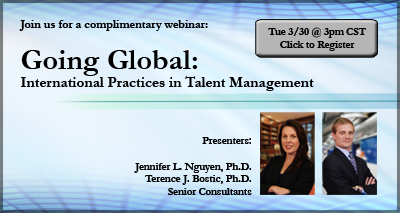Quickread Newsletter – Talent Management in the International Arena
How is talent management like an incandescent light bulb?
As unemployment swells globally, the conventional wisdom is that employees will cling to their jobs, appreciate their employers more, and show higher motivation levels. This is a dangerous misconception.
According to a study by the Center for Work-Life Policy, the number of employees expressing loyalty to their employers fell from 95% to 39% between June 2007 and December 2009. With regard to trust, the dip was 79% to 22%. Your most talented employees, those with the brightest futures at your organization, are the most likely to leave during downtimes. Talented employees have greater flexibility, and the old “organization man” model is a relic of the 20th century. Today’s workforce is more diverse and gender-balanced, favoring a discontinuous progression through multiple organizations.
The globalized marketplace adds another level of complexity to talent management. Marshall Goldsmith of Harvard Business Blogs rightly points out that it isn’t just organizations that are going global; it’s individuals, too. Whether you’re calling tech support in India or playing a game with a Facebook friend in Spain, globalization is no longer the exclusive terrain of businesses. These societal changes have rendered old talent management systems obsolete, shifting the focus from developing functional skills to retaining leaders who can build partnerships. Your organization needs people who get the strategic direction, who can step back and look at the big picture or work with individuals and teams at any level. These are the skills that translate across cultures.
This brings us back to the question: how is talent management like an incandescent light bulb? A few years ago, consumers started switching over to compact fluorescents. They’re just as bright, last longer, use less energy, and save you money. Incandescent bulbs burn out quickly, use more energy, and have to be replaced more often. Yet just as some people cling to the old technology, many companies still hold onto outdated ideas around talent management. The addition of high-quality data can have a major impact on your organization because talent, anywhere in the world, is a real competitive differentiator.
We hope you’ll join us for our webinar on March 30th.

